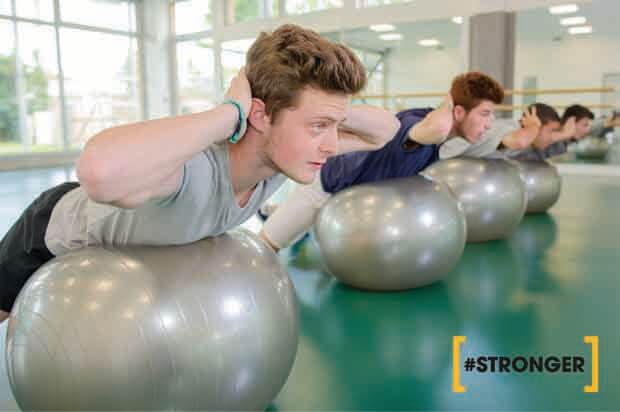Male body image and too much exercise
The unrealistic standards put on men and how their bodies should look is not discussed enough. Nor is the mental and physical impact from trying to meet these expectations. Writer Michael Handrick discusses the body pressures men face.

Don't exhaust yourself to look a certain way. It's not worth it.
From being given Action Man toys as boys, to shows such as Love Island or Bromans, or Cristiano Ronaldo fronting fashion campaigns—society idealises muscular and toned bodies, and we are conditioned to equate this body type with masculinity and beauty. Other body types can be the source of ridicule or viewed as ‘unmanly’ due to not meeting this notion, which can have a negative effect on how we view ourselves as well as our mental and physical health.
As humans we come in all shapes and sizes, and there is a significant lack of representation in the media we consume on a daily basis. Being subject to one particular body type may cause those who identify as male to feel pressured into looking one particular way, change the expectations of those we interact with, and may even cause them to expect others to look this way, too.
Isn’t exercise a good thing, though?
Being aware of your physical health, eating a balanced diet, and taking pride in how you look can all be good things. They can all have excellent social, mental and physical benefits that could help us become stronger, confident and happier.
However, excessively trying to meet the unrealistic standards set by the media can be detrimental to your health. The media can sow the idea that your body, in whatever glorious form it comes in, is not good enough unless it meets a muscular ideal. This could push some men to take unhealthy measures to try and reach these unattainable bodies.
As a result, some men may be taking extreme steps through dieting, exercise, and even taking anabolic steroids. Due to how we’ve been taught to be male, extreme exercise can be seen as positive. The perception that exercise and dieting can only be positive is a misconception and can develop a toxic sense of masculinity.
Men can have insecurities; we have pressures from the media and those around us, and it’s essential that we start engaging with each other and challenge the notion that manliness and beauty is tied to physical strength and tone.
How do I know if I’m exercising too much?
Body insecurities can affect everyone. It makes you no less of a man to struggle with your body image or be concerned about your wellbeing. It’s important to recognise if you are beginning to feel compulsive or anxious about your appearance and how much you exercise. The Body Dysmorphic Foundation has identified some signs that you can look out for:
- Panicking if you cannot work out
- Excessive work outs and weight-lifting
- Missing life commitments to exercise
- Steroid or supplement abuse to increase muscle mass
- Obsessively comparing and scrutinising your body
There are many stereotypes about who suffers from body anxieties and disorders. Men and boys can sometimes be seen as not as susceptible to these issues. We can be conditioned to think it’s weak to feel these anxieties and to not talk about them. But, it’s not shameful, or unmanly, so speak up and seek help. If you think you are struggling with your body image, and particularly with over-exercising, you can:
- Read self-care materials to create coping strategies
- Chat with your GP
- Try CBT (Cognitive Behavioural Therapy)
- Chat with someone you trust
Your strength is your individuality
The amazing thing about each and every one of us is our difference. What would life be if we all looked the same, behaved the same, conformed to one idealised way of looking? Historical and societal greats such as Ghandi and Mandela are not respected for their muscle mass but the strength of their resilience, character and beliefs. What people should, and ultimately, will like about you is not the size of your muscles, but the size of your heart and your strength as a person. Your strength is your uniqueness.
Next Steps
- CALM is dedicated to preventing male suicide. Call their national helpline for free on 0800 58 58 58, 5pm-midnight, or visit their webchat service .
- The Self-Esteem Team (SET) run workshops in schools across the UK to help tackle young people's issues with body image, self-worth and mental health.
- Chat about this subject on our Discussion Boards.
By Michael Handrick
Updated on 23-Nov-2017
No featured article










